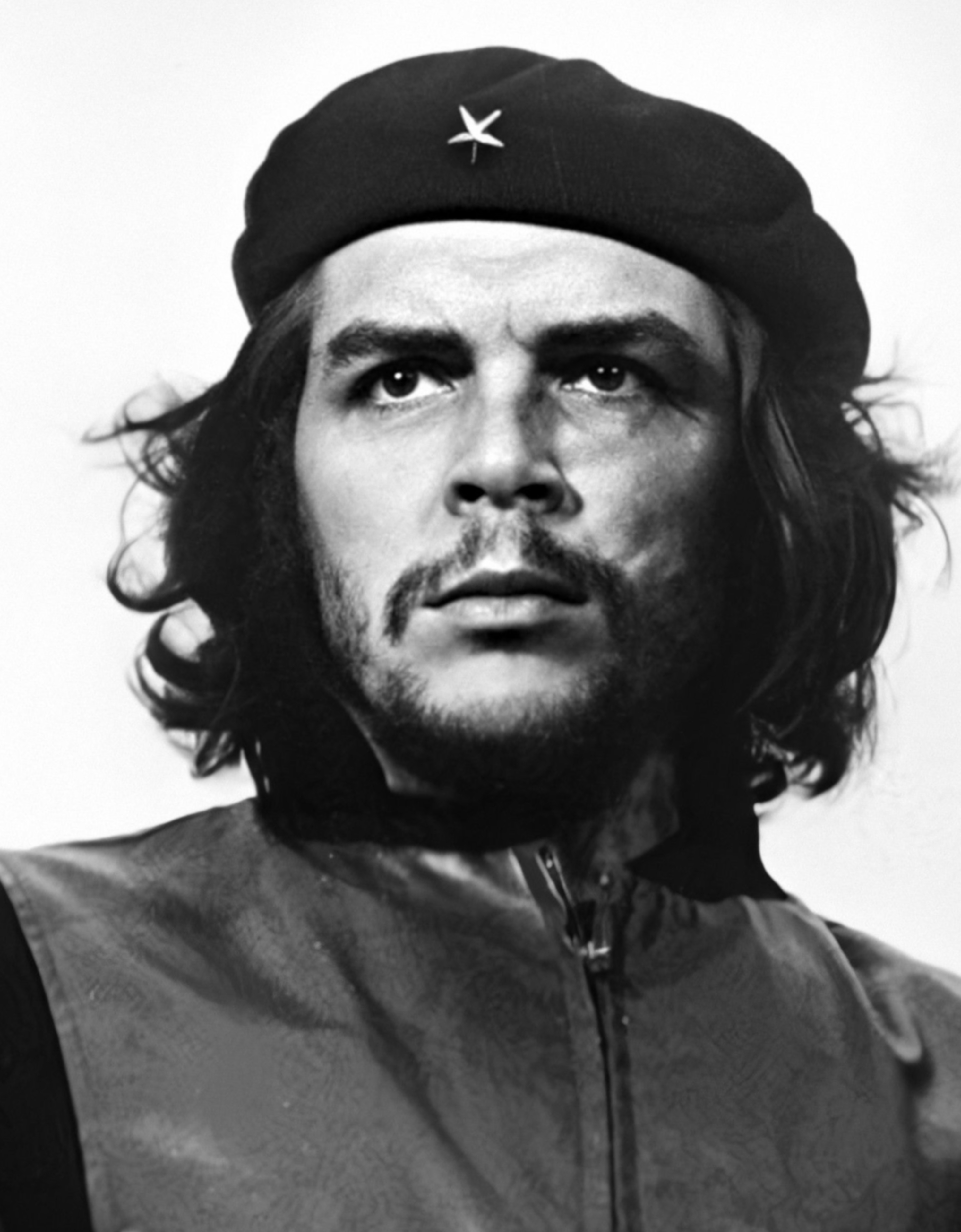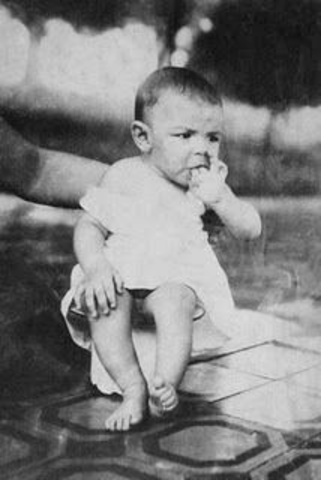More languages
More actions
m (Death) Tag: Visual edit |
(Speech in Algiers) Tag: Visual edit |
||
| Line 17: | Line 17: | ||
'''Ernesto''' "'''Che'''" '''Guevara''' {{Datebio|birthday=14th|birthmonth=June|birthyear=1928|deathday=9th|deathmonth=October|deathyear=1967}} was a [[Latin America|Latin-American]] [[Marxism–Leninism|Marxist-Leninist]] revolutionary and a leader of the [[Cuban Revolution]], alongside [[Fidel Castro]]. During his time in the government of [[Republic of Cuba|Cuba]], he was appointed president of the [[Central Bank of Cuba]] in 1959 and later Minister of Industry in 1961.<ref>{{Textcite|author=Richard L. Harris|year=2011|chapter=Timeline: events in the life of Che Guevara|title=Che Guevara: a biography|isbn=978-0-313-35916-3|city=Santa Barbara, Califonia|publisher=Greenwood|lg=http://libgen.rs/book/index.php?md5=E894F200B27B2693CC5B5229B5DE50A3}}</ref> | '''Ernesto''' "'''Che'''" '''Guevara''' {{Datebio|birthday=14th|birthmonth=June|birthyear=1928|deathday=9th|deathmonth=October|deathyear=1967}} was a [[Latin America|Latin-American]] [[Marxism–Leninism|Marxist-Leninist]] revolutionary and a leader of the [[Cuban Revolution]], alongside [[Fidel Castro]]. During his time in the government of [[Republic of Cuba|Cuba]], he was appointed president of the [[Central Bank of Cuba]] in 1959 and later Minister of Industry in 1961.<ref>{{Textcite|author=Richard L. Harris|year=2011|chapter=Timeline: events in the life of Che Guevara|title=Che Guevara: a biography|isbn=978-0-313-35916-3|city=Santa Barbara, Califonia|publisher=Greenwood|lg=http://libgen.rs/book/index.php?md5=E894F200B27B2693CC5B5229B5DE50A3}}</ref> | ||
Che was part of an expedition led by [[Fidel Castro]] that directed the [[armed struggle]] against the [[United States imperialism|US-backed]] Cuban dictator [[Fulgencio Batista]]. Guevara also presided over Cuban delegations that visited various countries and was a representative of the revolutionary government in important international conclaves. During the October Crisis he was appointed military chief of the province of Pinar del Río. | Che was part of an expedition led by [[Fidel Castro]] that directed the [[Cuban Revolution|armed struggle]] against the [[United States imperialism|US-backed]] Cuban dictator [[Fulgencio Batista]]. Guevara also presided over Cuban delegations that visited various countries and was a representative of the revolutionary government in important international conclaves. During the October Crisis he was appointed military chief of the province of Pinar del Río. | ||
In 1965 Che left Cuba to set up guerrilla forces first in the [[Democratic Republic of the Congo|Congo]] and then later in [[Plurinational State of Bolivia|Bolivia]], where he was ultimately captured and killed in October 1967. | In 1965 Che left Cuba to set up guerrilla forces first in the [[Democratic Republic of the Congo|Congo]] and then later in [[Plurinational State of Bolivia|Bolivia]], where he was ultimately captured and killed in October 1967. Accounts of his execution have varied over the years, but many contemporary accounts indicate some degree of collaboration between Bolivia's government troops and the [[United States of America|United States]]' [[Central Intelligence Agency|CIA]]. Che Guevara developed a theory of primacy of military struggle, in particular concept of guerilla ''foquismo''. Many of Che's theories regarding guerilla tactics are articulated in his 1961 work "[[Guerilla warfare (Che Guevara work)|Guerilla Warfare]]." | ||
== History == | == History == | ||
| Line 27: | Line 27: | ||
Ernesto Guevara was born to his father Ernesto Guevara Lynch and his mother Celia de la Serna y Llosa in the city of Rosario, [[Argentine Republic|Argentina]] on May 14th, 1928, despite his birth certificate recording his birth a month later. His mother got pregnant before she was married to his father and they hid baby Che from their families for one month after he was born.<ref name=":0">{{Textcite|author=Jon Lee Anderson|year=2010|title=Che Guevara: a revolutionary life|chapter=A plantation in Misiones|isbn=978-0-8021-9725-2|publisher=Grove Press|lg=http://libgen.rs/book/index.php?md5=3E3E1D3A68BF27293A12BC1076076C7B}}</ref> Che spoke Spanish with a typical La Plata accent, common in the regions of [[Uruguay]], south of [[Federative Republic of Brazil|Brazil]] and the northeast region of Argentina, which makes frequent use of the interjection "che" in the speech. This characteristic accent would render Guevara's nickname "Che".<ref name=":1">{{Textcite|author=I. Lavretsky|year=1976|title=Ernesto Che Guevara|chapter=First steps|publisher=Progress Publishers|lg=http://libgen.rs/book/index.php?md5=3DA588DC804F57A9857A5A563BB5D2A3}}</ref> | Ernesto Guevara was born to his father Ernesto Guevara Lynch and his mother Celia de la Serna y Llosa in the city of Rosario, [[Argentine Republic|Argentina]] on May 14th, 1928, despite his birth certificate recording his birth a month later. His mother got pregnant before she was married to his father and they hid baby Che from their families for one month after he was born.<ref name=":0">{{Textcite|author=Jon Lee Anderson|year=2010|title=Che Guevara: a revolutionary life|chapter=A plantation in Misiones|isbn=978-0-8021-9725-2|publisher=Grove Press|lg=http://libgen.rs/book/index.php?md5=3E3E1D3A68BF27293A12BC1076076C7B}}</ref> Che spoke Spanish with a typical La Plata accent, common in the regions of [[Uruguay]], south of [[Federative Republic of Brazil|Brazil]] and the northeast region of Argentina, which makes frequent use of the interjection "che" in the speech. This characteristic accent would render Guevara's nickname "Che".<ref name=":1">{{Textcite|author=I. Lavretsky|year=1976|title=Ernesto Che Guevara|chapter=First steps|publisher=Progress Publishers|lg=http://libgen.rs/book/index.php?md5=3DA588DC804F57A9857A5A563BB5D2A3}}</ref> | ||
Che Guevara's mother had [[Kingdom of Spain|Spanish]] descent, from the Argentine colonial era nobility, and his father had [[Republic of Ireland|Irish]] descent, also from an | Che Guevara's mother had [[Kingdom of Spain|Spanish]] descent, from the Argentine colonial era nobility, and his father had [[Republic of Ireland|Irish]] descent, also from an aristocratic family.<ref name=":1" /><ref name=":0" /> During his childhood, Che developed chronic asthma, which would afflict his health for his whole life.<ref name=":0" /> | ||
=== Continental motorcycle travels (1950–1952)=== | === Continental motorcycle travels (1950–1952)=== | ||
| Line 36: | Line 36: | ||
===Governance in Cuba (1959–1965)=== | ===Governance in Cuba (1959–1965)=== | ||
On 24 February 1965, Che addressed the Second Economic Seminar of Afro-Asian Solidarity in [[People's Democratic Republic of Algeria|Algeria]]. He called for [[Socialist state|socialist countries]] to support post-colonial states in order to protect them from [[Imperialism|imperialist]] [[Bank|banks]]. He said trade between socialist countries should help both countries develop.<ref name=":022">{{Citation|author=[[Vijay Prashad]]|year=2017|title=Red Star over the Third World|chapter=Colonial Fascism|page=113|pdf=https://cloudflare-ipfs.com/ipfs/bafykbzacecu7gb2ei65us6ip3r2ugcgkblneqcftbm456mb6bzvprkbqk55qm?filename=Vijay%20Prashad%20-%20Red%20Star%20Over%20the%20Third%20World-LeftWord%20Books%20%282018%29.pdf|city=New Delhi|publisher=LeftWord Books}}</ref> | |||
===Struggle in Congo (1965–1966)=== | ===Struggle in Congo (1965–1966)=== | ||
Revision as of 15:10, 18 June 2023
Ernesto Guevara | |
|---|---|
 Portrait of comrade Che | |
| Born | Ernesto Guevara June 14, 1928 Rosario, Santa Fé Province, Argentina |
| Died | October 9, 1967 (aged 39) La Higuera, Vallegrande Province, Bolivia. |
| Cause of death | Capture and execution by the Bolivian state |
| Nationality | Argentinian |
| Political orientation | Marxism-Leninism |
Ernesto "Che" Guevara (June 14th, 1928 — October 9th, 1967) was a Latin-American Marxist-Leninist revolutionary and a leader of the Cuban Revolution, alongside Fidel Castro. During his time in the government of Cuba, he was appointed president of the Central Bank of Cuba in 1959 and later Minister of Industry in 1961.[1]
Che was part of an expedition led by Fidel Castro that directed the armed struggle against the US-backed Cuban dictator Fulgencio Batista. Guevara also presided over Cuban delegations that visited various countries and was a representative of the revolutionary government in important international conclaves. During the October Crisis he was appointed military chief of the province of Pinar del Río.
In 1965 Che left Cuba to set up guerrilla forces first in the Congo and then later in Bolivia, where he was ultimately captured and killed in October 1967. Accounts of his execution have varied over the years, but many contemporary accounts indicate some degree of collaboration between Bolivia's government troops and the United States' CIA. Che Guevara developed a theory of primacy of military struggle, in particular concept of guerilla foquismo. Many of Che's theories regarding guerilla tactics are articulated in his 1961 work "Guerilla Warfare."
History
Early life in Argentina (1928–1950)

Ernesto Guevara was born to his father Ernesto Guevara Lynch and his mother Celia de la Serna y Llosa in the city of Rosario, Argentina on May 14th, 1928, despite his birth certificate recording his birth a month later. His mother got pregnant before she was married to his father and they hid baby Che from their families for one month after he was born.[2] Che spoke Spanish with a typical La Plata accent, common in the regions of Uruguay, south of Brazil and the northeast region of Argentina, which makes frequent use of the interjection "che" in the speech. This characteristic accent would render Guevara's nickname "Che".[3]
Che Guevara's mother had Spanish descent, from the Argentine colonial era nobility, and his father had Irish descent, also from an aristocratic family.[3][2] During his childhood, Che developed chronic asthma, which would afflict his health for his whole life.[2]
Continental motorcycle travels (1950–1952)
Guatemala and Mexico (1952–1955)
Cuban Revolution (1956–1958)
Governance in Cuba (1959–1965)
On 24 February 1965, Che addressed the Second Economic Seminar of Afro-Asian Solidarity in Algeria. He called for socialist countries to support post-colonial states in order to protect them from imperialist banks. He said trade between socialist countries should help both countries develop.[4]
Struggle in Congo (1965–1966)
Struggle in Bolivia and capture (1966–1967)
The CIA, working with wealthy Cuban exiles, captured and murdered Che Guevara in Bolivia in 1967.[5]
Works
Guerrilla warfare
Reminiscences of the Cuban revolutionary war
On revolutionary medicine
Bibliography
Che Guevara biographies
- Richard L. Harris (2011). Che Guevara: a biography. Santa Barbara, Califonia: Greenwood. ISBN 978-0-313-35916-3 [LG]
- Fidel Castro (2006). Che: a memoir. Melbourne: Ocean Press. ISBN 978-1-921700-83-5 [LG]
- Jon Lee Anderson (2010). Che: a revolutionary life. Grove Press. ISBN 978-0-8021-9725-2 [LG]
- Jorge G. Castañeda (1998). Compañero: the life and death of Che Guevara. New York: Vintage Books. ISBN 9780679759409 [LG]
References
- ↑ Richard L. Harris (2011). 'Timeline: events in the life of Che Guevara' in Che Guevara: a biography. Santa Barbara, Califonia: Greenwood. ISBN 978-0-313-35916-3 [LG]
- ↑ 2.0 2.1 2.2 Jon Lee Anderson (2010). 'A plantation in Misiones' in Che Guevara: a revolutionary life. Grove Press. ISBN 978-0-8021-9725-2 [LG]
- ↑ 3.0 3.1 I. Lavretsky (1976). 'First steps' in Ernesto Che Guevara. Progress Publishers. [LG]
- ↑ Vijay Prashad (2017). Red Star over the Third World: 'Colonial Fascism' (p. 113). [PDF] New Delhi: LeftWord Books.
- ↑ William Blum (2002). Rogue State: A Guide to the World's Only Superpower: 'A Concise History of United States Global Interventions, 1945 to the Present' (p. 123). [PDF] Zed Books Ltd. ISBN 9781842772201 [LG]
